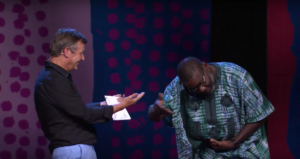I remember this piece with some fondness. It was the first of many ‘Preface to Cover’ essays I was to write for Newswatch magazine in its halcyon days of ground breaking print journalism. I remember the late Dele Giwa coming up to the library, snooping over my shoulders as I wrote (long hand) the opening paragraphs of this essay. He read it and with a broad smile breaking across his face, he left me to write my piece. The theme of this essay remains quite familiar, even as it has over the last thirty years metastasized into the wall to wall, floor to ceiling systemic corruption that is now the Nigerian State. So what do I say now about corruption? Nothing. I am speechless. I believe that systemic corruption on this scale will eventually destroy the entity know as Nigeria, and it is just matter of time. However, permit me to quote myself as I repeat this favourite phrase in the essay.” A billion, two billion; what does it mean? Digits better suited for astronomical computations have become generic expressions of national graft. Where will it end?”
THOU SHALT NOT STEAL
“The greatest robbery on record was that of the Reich bank following Germany’s collapse in April/May 1945… estimates of the total haul at current values stand at £2, 500 million,” according to the Guinness Book of Records. “£5,000m Nigeria Forgery Racket,” said a British newspaper on August 28, 1983. “You shall not steal,” says God, Exodus 20:15.
The Decalogue is scrupulously clear on that point, indeed along with nine other formidable injunctions, it constitutes a divine decagon, that should, if obeyed should save mankind from the decadence and degeneracy of his existence, but then who wants to be saved? Or perhaps, who can be saved? After the scripture has damned us all to ante-natal guilt and sin, by declaring that we are all sinners even before we are born, what chances have we got at post-natal piety?
The creationist will argue that the plea for pre-natal absolution is hogwash, that man is a sinner not necessarily because he has not sinned (at least to the best of his recollections) but because of an atavistic throw back to Adam and Eve, the apple and the serpent. And it is well known what happened. And so man stands accused, guilty of a misdemeanour against God which he did not actually commit, but guilty even more so for multiplying the original sin many time over.
It is interesting to note that in spite of the magnitude and intense complexity of man’s folly and foibles, when cleaned down to the bone of rectitude, the 10 Commandments is quite simply a good guide to good living. It is simple, it is unequivocal, and it is concise.
But living, lamentably, is hardly like that. Life for most is a rumbustious and freewheeling gamble of loose ends, jagged point, precarious footholds and short ends, all weighing heavily in the balance against probity, love, truth and all other such “goody-goody” ideals.
In this existentialist jungle, what is to be done when one spies the forbidden fruit? “Take the money and run!” That seems to be the general consensus. The Allied Forces did precisely that after the Soviet Red Army, having recovered from Hitler’s blitzkrieg in what was undoubtedly the greatest battle of World War II, thrust deep into the heart of fascism by taking Berlin. The spoils of the Fuhrer now lay before the conquerors. And take they did: £2,500 million in gold bars and coins.
An extraordinary amount, no doubt, but then the circumstances were no less unusual. The Second World War was an extraordinary event, and, besides, all is fair in love and war. Or put more classically: the end justifies the means. Within the context of war, mortality becomes elastic. It stretches to accommodates and justify the death and dysfunction of man destroying man. Larceny, therefore, is an inconsequential by product. But during “ordinary times,” in a milieu of relative peace and stability, the conscience is more acute, grave anti-social acts are not easily discountenanced. The public conscience is well and alive ruminating over the changing cultural ethic, tolerant within the bounds of good judgment, and judgmental when the moral mean is breeched.
In societies with little social tension, the deviant is steered back in to course, without as much as a hiccup in the flow of the body polity. In more high-strung societies, the deviant is more rebellious, more adventurous, more brazen, and predictably the backlash of moral indignation is usually more dramatic.
The ensanguined pulpy remains of a youngman battered by an irate mob into the hereafter for stealing (or attempting to steal) a car tire, the smoking and charred remnants of a common thief incinerated by a pyromaniacal public whose probity is in doubt, the bullet ridden corpse of a robber who has literally run afoul of the law, there are examples all so familiar in Nigeria. And so, radio jingles and indignant letters to the editor would like to say, the wage of that particular sin is death. But then there are other sins, not unlike brigandage, that seem to find acceptance. Somehow, within the prevailing context, a quirk rationalization gives such high sounding crimes, like embezzlement, defalcation and misappropriation, a tolerable human face.
True: the daring do of thieves has long been romanticized by folklorists everywhere for centuries-the philanthropic Robin Hood of Sherwood Forest, and the mystical Ali Baba and his posse of 40 thieves still make good entertainment for the young and gullible. But when the latter day Robin Hood does not rob the rich to give to the poor, and Ali Baba and his kleptocratic 40 thieves wear full blown baba rigas and shun the magic carpet for the executive jet, the story is hardly a laughing matter. Neither is the amount of money involved.
A billion, two billion; what does it mean? Digits better suited for astronomical computations have become generic expressions of national graft. Where will it end? And in such colossal proportions, the glib arguments for self-preservation are reduced from the sublime to the ridiculous, if not the insane. Larceny on that scale is unconscionable. And this is precisely why the injunction, thou shalt not steal, is categorically, and why it holds true for one kobo or one billion naira.
But what will public conscience do? It is clear that the ruling class does not want to be hoisted by its own moral petard. Some years ago, the amount was N2.8 billion, today it is N6.2 billion. Diogenes, an apocryphal Greek figure, is said to have trudged the length and breadth of Greece looking for an honest man. He never found one. Ancient Greece might very well be modern day Nigeria.
Tunji Lardner for Newswatch January 13, 1986



